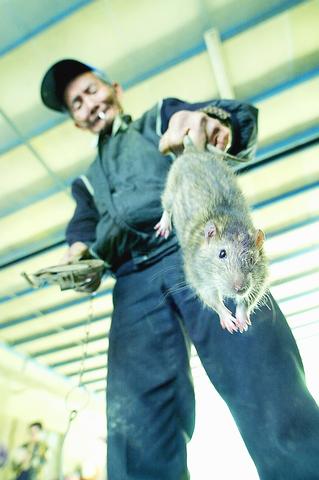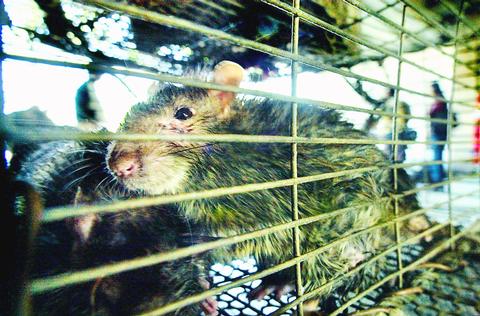Having rats in the kitchen would scare away most diners. But at the Peaceful Happiness Restaurant, customers love the critters -- stir-fried, stewed or mixed with noodles.
The small, no-frills restaurant is one of several in Chiayi that are serving the rodents, whose flesh has a rubbery, chewy texture and tastes like dark turkey meat with a bit of a gamey flavor.
Many Taiwanese are adventurous eaters who have no qualms about munching on deep-fried hornets, crickets, sea slugs, and snakes.

PHOTO: AP
Some are inspired by curiosity or the quest for novelty, while others believe unusual food has medicinal properties.
Although business was brisk during a recent lunch hour at Peaceful Happiness, cook Hung Hung-wen acknowledged that some people -- especially women -- draw the line when it comes to eating rats.
"The meat is tender and clean. It's a pity that women are usually too frightened to try it," said Hung, whose business card shows a rodent with a red bow tied to its long tail.

PHOTO: AP
Dressed in a chef's white jacket, Hung arranged ingredients for a stir fry on a stainless steel counter in his spotless kitchen: red peppers, ginger, garlic and two large rats on a plate -- their fur and whiskers cleanly shaved off with a razor and their ears removed. A thick tongue stuck out of one rat's open mouth that revealed a big yellow buck tooth.
As in other small-town restaurants in Taiwan, Hung's kitchen is at the front of the restaurant, allowing customers to watch him as he chopped rat carcasses into chunks and threw them into a small pot with other ingredients.
He said his rats are especially tasty because they're caught in farm fields. "Unlike house rats, these field rats exercise a lot and have strong muscles."
At a nearby table, customer Lee Tien-hua gave a thumbs-up sign after putting a piece of rat meat into his mouth.
"It's good," said Lee, a Chiayi County government official.
Lee's party of eight drank beer and joked as they feasted on rat stew in a clay pot, fried shrimp and braised pork.
Many farmers moonlight as rat catchers in Chiayi's sugarcane fields. A kilogram of rat meat fetches NT$320, five times that of chicken meat and more than double that of pork.
Much of the rat meat served at Peaceful Happiness and other restaurants is supplied by a man known locally as the "Rat catcher King" -- Cheng Chiu-nan, a 46-year-old melon farmer with a dark, leathery face and a passion for stalking vermin.
Locals say Cheng holds the national rat-catching record of 600 in one night.
Some farmers use nets to catch rats, which start scurrying when they hear the roar of tractors and threshers. Others use dogs to track the rodents when they squeeze down holes.
Cheng dismisses such rat catchers as amateurs.
"They even catch skinny rats," he scoffed. "Rats are nocturnal animals. One should do the job at night."
Cheng's favorite rat-hunting tool is the ankle-busting steel spring trap. His wife helps him harvest the trapped critters, which get thrown into a sack he carries over his back. For a visitor, he grabbed about seven wiggling, grayish brown rats by the tails and held them up like a trophy.
Throwing the bags into the back of his pickup truck, Cheng takes them back to his garage. The rats are kept in steel mesh cages, where they squeal and crawl over each other as they wait to be butchered and shaved with a barber's razor by Cheng's wife, who handles the rats with pink dishwashing gloves.
As the oldest of six sons, Cheng subsidized his father's meager farm income by fishing in drainage ditches and rivers. But when the water became polluted and the fish disappeared, he switched to catching snakes used for soup.
He got out of the snake business when the government began levying heavy fines on those who catch rare or endangered species.
He finally found his niche with rats.
"I'd be a millionaire if I did not squander my money on gambling and womanizing when I was younger," he said.

A Chinese aircraft carrier group entered Japan’s economic waters over the weekend, before exiting to conduct drills involving fighter jets, the Japanese Ministry of Defense said yesterday. The Liaoning aircraft carrier, two missile destroyers and one fast combat supply ship sailed about 300km southwest of Japan’s easternmost island of Minamitori on Saturday, a ministry statement said. It was the first time a Chinese aircraft carrier had entered that part of Japan’s exclusive economic zone (EEZ), a ministry spokesman said. “We think the Chinese military is trying to improve its operational capability and ability to conduct operations in distant areas,” the spokesman said. China’s growing

Nine retired generals from Taiwan, Japan and the US have been invited to participate in a tabletop exercise hosted by the Taipei School of Economics and Political Science Foundation tomorrow and Wednesday that simulates a potential Chinese invasion of Taiwan in 2030, the foundation said yesterday. The five retired Taiwanese generals would include retired admiral Lee Hsi-min (李喜明), joined by retired US Navy admiral Michael Mullen and former chief of staff of the Japan Self-Defense Forces general Shigeru Iwasaki, it said. The simulation aims to offer strategic insights into regional security and peace in the Taiwan Strait, it added. Foundation chair Huang Huang-hsiung

PUBLIC WARNING: The two students had been tricked into going to Hong Kong for a ‘high-paying’ job, which sent them to a scam center in Cambodia Police warned the public not to trust job advertisements touting high pay abroad following the return of two college students over the weekend who had been trafficked and forced to work at a cyberscam center in Cambodia. The two victims, surnamed Lee (李), 18, and Lin (林), 19, were interviewed by police after landing in Taiwan on Saturday. Taichung’s Chingshui Police Precinct said in a statement yesterday that the two students are good friends, and Lin had suspended her studies after seeing the ad promising good pay to work in Hong Kong. Lee’s grandfather on Thursday reported to police that Lee had sent

A Chinese ship ran aground in stormy weather in shallow waters off a Philippines-controlled island in the disputed South China Sea, prompting Filipino forces to go on alert, Philippine military officials said yesterday. When Philippine forces assessed that the Chinese fishing vessel appeared to have run aground in the shallows east of Thitu Island (Jhongye Island, 中業島) on Saturday due to bad weather, Philippine military and coast guard personnel deployed to provide help, but later saw that the ship had been extricated, Philippine navy regional spokesperson Ellaine Rose Collado said. No other details were immediately available, including if there were injuries among